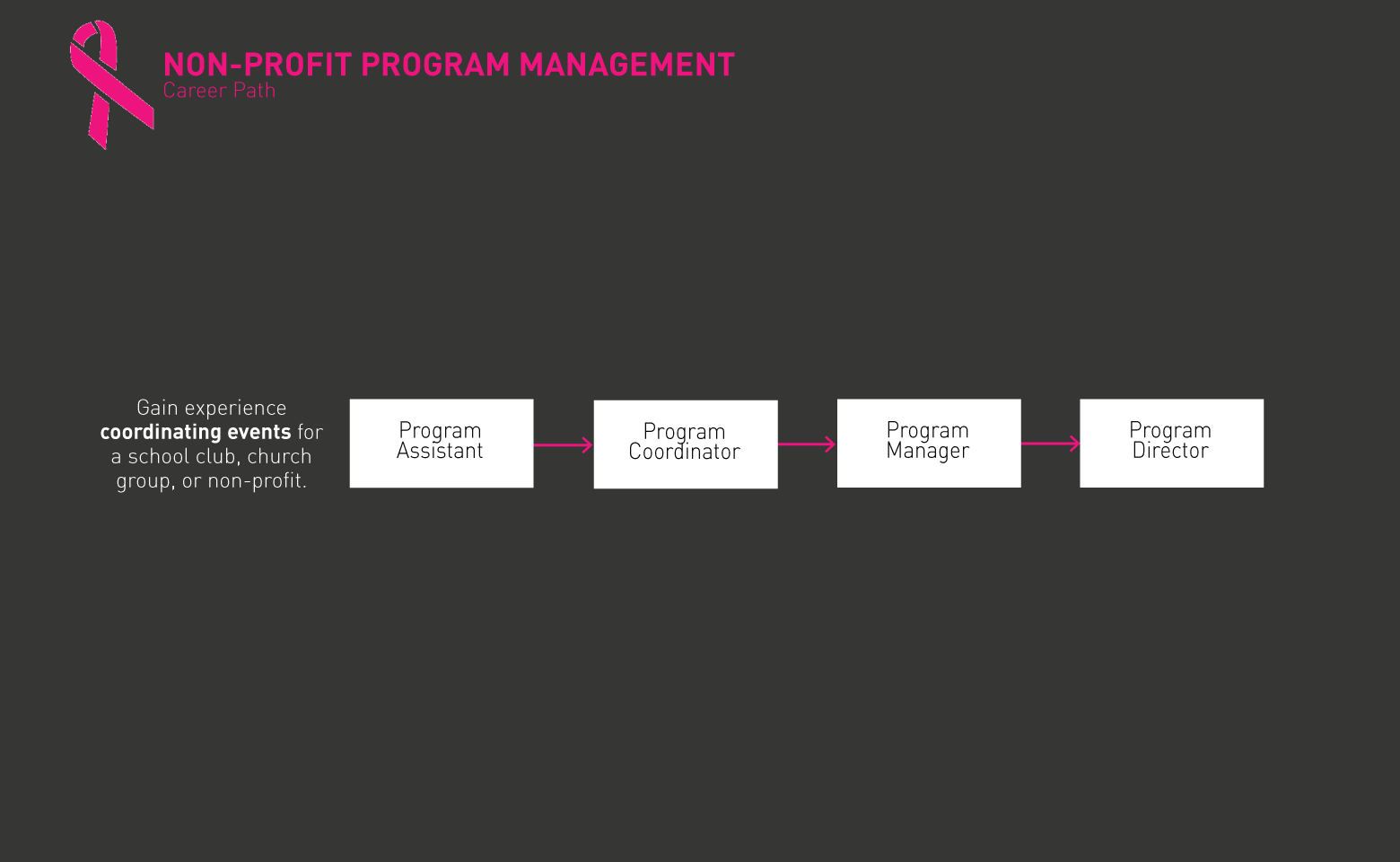스포트라이트
Program Director, Program Manager, Program Coordinator, Project Manager, Non-Profit Manager, Program Administrator, Community Development Manager, Program Operations Manager, Program Evaluation Specialist, Impact Manager, Human Services Program Specialist, Program Associate, Program Officer
Program Managers are responsible for planning, managing, and implementing activities/projects that will help improve their non-profit’s overall performance and achieve their mission.
“Seeing people benefit from the positive outcomes of the programs you have created and implemented.” Sharon Preston, Senior Program Manager, Junior Achievement Northern California
- Implements program growth/expansion strategic plan.
- Recruits program volunteers to meet program goals by securing new sources for volunteers and renewals from existing volunteer sources. Develops and delivers recruiting presentations.
- Assures program quality through phone calls, classroom monitoring, participant servicing, evaluation instruments and newsletters. Continually provides feedback, program materials and resources to consultants and teachers.
- Develops and implements volunteer orientation programs, i.e., securing location of training, developing orientation materials, scheduling volunteers, ordering program materials, distributing registration and evaluation forms.
- Develops and implements methods of volunteer recognition, i.e., planning logistics of event(s); informing consultants, teachers, school administrators and business executives of event; planning and distributing appreciation materials.
- 디테일 지향
- Being a leader
- Sales, marketing, public relations
- Training/teaching experience
- 프리젠 테이션 기술
- 자기 동기 부여
- Math (budget management)
- Strong written/oral communication
- 이벤트 계획
- 프로젝트 관리
- Knowledge of database management; computer literacy (ex. Microsoft Office.)
- 세부 사항에주의
- Long hours
- Willingness to travel
- Having a flexible schedule
- Was involved with organizing school activities.
- Participated in organizations as club officers, running for school offices and participating in class government.
- Many Non-Profit Program Managers complete a bachelor’s or even a Master’s in Nonprofit Management. Some complete degrees in other majors, like finance, business, public policy, international relations, communications, education, health services, or law
- They may supplement those degrees with a certification, like Colorado State’s Certificate in Nonprofit Management
- Some students go for a more generalized certification, such as Project Management Institute’s Project Management Professional
- Experience is a key element in becoming an effective Non-Profit Program Manager. In addition to academic requirements, it is common to learn the ropes through entry-level jobs or volunteerism
- Students can learn practical skills including teamwork and leadership through relevant nonprofit internships
- Non-Profit Program Managers must master several skills related to budgeting, staffing, legal matters, and of course subjects relevant to the organization’s niche (such as social causes, education, the environment, etc.)
- It is important to be aware of nonprofit fundraising laws and regulations, including 501(c)(3) requirements, tax considerations, and data privacy. Nonprofit accounting basics are also essential
- Stock up on classes such as English, writing, speech, business, math, economics, marketing, and project management
- Study current issues and causes in which nonprofits are involved. Look for areas where more could be done
- Participate in complex extracurricular activities to develop soft skills along with organization and project management skills
- Volunteer for challenging roles within student and local community organizations. Don’t go for the easy stuff!
- Common volunteer opportunities include after-school programs, youth services, religious organizations, homeless shelters, human rights organizations, veterans service organizations, and Big Brothers Big Sisters of America
- Apply for nonprofit internships and entry-level jobs. Ask to shadow the managers and let them know you want to learn all you can. Take it seriously, ask questions, pay attention, and keep notes!
- Make sure you are committed for the long term to whatever causes you want to advocate for. Common nonprofit niches include:
- 동물 권리
- 교육
- 환경
- 환경
- 정부 문제
- 인권
- 국제 문제
- 사회 정의
- Join or start a student organization devoted to hot topics, and learn how to delegate authority
- 관심있는 원인에 전념하는 지역 단체와 계속 참여하십시오.
- Read plenty of books offering lessons learned and advice for success (see our Resources > Books section)
- Beef up relevant skills that your academic major doesn’t cover. You can take ad hoc courses from Udemy or Coursera for things like leadership, accounting, fundraising, or other topics you should have a general knowledge of
- Knock out a project management certification such as PMI’s Project Management Professional
“This will expose you to managing logistics, familiarize you with working within a budget, position you to speak with a variety of stakeholders and professionals to arrange the details.” Sharon Preston, Senior Program Manager, Junior Achievement Northern California
- Indiana University—Bloomington
- Syracuse University (Maxwell)
- University of Minnesota—Twin Cities (Humphrey)
- University of Washington (Evans)
- Georgia State University (Young)
- New York University (Wagner)
- Indiana University-Purdue University—Indianapolis
- University of Southern California (Price)
- 애리조나 주립 대학
- University at Albany—SUNY (Rockefeller)

- Non-Profit Program Managers may need to rack up a few years of related work experience to land a job at a larger organization, but smaller nonprofits or startups may be willing to hire a recent college grad with an internship or volunteer experience
- As you intern or volunteer, make yourself invaluable in the workplace. Earn a reputation as someone who is highly organized, keeps things running smoothly, and knows how to motivate teams
- 일자리와 인턴십을 찾으십시오. 참으로, 단순하게 고용, 유리문, 또는 다른 직업 포털
- 비영리 구직 위원회에는 National Nonprofits, National Council of Nonprofits, Chronicle of Philanthropy, ExecSearch 및 DevEx가 포함됩니다.
- Contact nonprofits you’re interested in working for and check out their website careers pages
- Let your professors and supervisors know your goals. Ask for mentorship and for help connecting with nonprofits that might be hiring. Also, see if they’re willing to serve as professional references
- If your school has a career center, see if they can help you craft a standout nonprofit-related resume and practice mock interviewing
- Research your alumni network to see who is active in the nonprofit world. Don’t be shy about reaching out to them!
- If applicable to your past work experience, create an online portfolio that might help demonstrate your skills, such as fundraising campaigns, large projects you’ve managed, or social media successes
- Review sample nonprofit-related interview questions from various online sources to get a good feel for the types of questions you can expect
- Be an overall strong leader.
- Be diplomatic
- Make definitive decisions.
- Anticipate problems your program will face and know how to fix them.
Join a professional organization such as PMI.org and network with the members to engage mentors.
웹사이트
- 국제앰네스티 미국
- 박애주의 연대기
- 데벡스
- ExecSearchs
- 휴먼라이츠워치
- 이상주의자
- 국제노동기구
- 변호사인권위원회
- 전국 비영리 단체 협의회
- 국립 비영리 자원 센터
- 국가 비영리 단체
- 인권 고등 판무관실
- 자선 저널
- 프로젝트 관리 연구소
- 유엔 재단
- 유엔 국제 아동 비상 기금
- 유엔난민기구
- 세계 보건기구
책
- Nonprofit Management: Principles and Practice, by Michael J. Worth
- Nonprofit Management 101: A Complete and Practical Guide for Leaders and Professionals, by Laila Brenner and Darian Rodriguez
- The Little Book of Nonprofit Leadership: An Executive Director's Handbook for Small (and Very Small) Nonprofits, by Erik Hanberg
Program Management skills can be used in a variety of environments and industries such as: sports, entertainment, hospitality, technology, education etc.
“In the end, it’s all about making sure your program comes out on time and within budget.” Sharon Preston, Senior Program Manager, Junior Achievement of Northern California
뉴스 피드

주요 채용 정보

온라인 과정 및 도구







